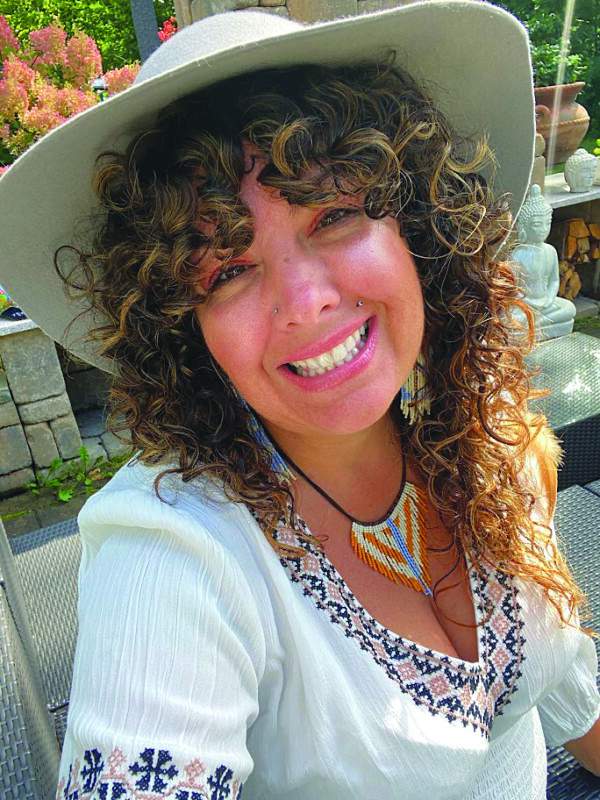Kaylon Sweet — known by many simply as “Sweets” — is the owner of Osteria Poggio (18 Main St., Center Harbor, 250-8007, osteriapoggio.com), a farm-to-table Italian eatery set inside the historic Coe House, which overlooks Lake Winnipesaukee. In late January, he also took over culinary operations of the Mak’n Ends Meat food truck (maknendsmeat.com, and on Facebook and Instagram @maknendsmeat) as part of a collaboration with its owners, the Osgood family of Birch Rise Farm in Sanbornton. Mak’n Ends Meat is unique for utilizing Birch Rise’s own farm-raised proteins on board the truck, giving Sweet the opportunity to dabble in all kinds of menu options, such as pork smash burgers, chicken tacos, ham and cheese “foldies,” and ramen burgers topped with a house Japanese-style barbecue sauce. One of Sweet’s first restaurant jobs was at Cookie’s Chuck Wagon in Hudson, a town where he lived for a few years as a teenager — since then, he has studied Italian cuisine abroad in Florence and, upon returning to the Granite State, has gone on to establish himself as a chef working closely with local farms in sourcing his ingredients. Locally, you can find Mak’n Ends Meat parked at Lithermans Limited Brewery (126B Hall St., Concord) on Friday, March 25, from 4 to 8 p.m. Sweet will then return to Lithermans for its six-year anniversary celebration on April 8 and April 9, and he’s also due to appear at Great North Aleworks (1050 Holt Ave., Manchester) on April 16.
What is your must-have kitchen item?
You’ve got to have a nice flat metal spatula and a towel. … I can make everything else work with those items.
What would you have for your last meal?
My mom makes these pork ribs with a barbecue sauce recipe that my grandmother gave her … [and] they always come out absolutely amazing. I’d want those one last time. She does a chocolate raspberry cheesecake too that I go nuts for. … Then I would also have our Caesar salad with our house hot sauce squirted into it, and some smoked Gouda mac and cheese with honey. It’s your last meal, so you’ve got to make it count, you know?
What is your favorite local restaurant?
The Thompson House Eatery up in Jackson is one. I have a buddy who owns it. He was just up for a [James] Beard [award] and he’s definitely earned it. … I’d also have to say The Wilder in Portsmouth. It’s always fantastic.
What celebrity would you like to see ordering from the truck?
[Chef] Mason Hereford from Turkey and the Wolf, which is a sandwich place in New Orleans. His claim to fame is a fried bologna sandwich. … He’s somebody that I follow religiously on all of the social media platforms. He’s very much a guy that is who he is … [and] I’d like to have him come through because I know I’d get an honest answer out of him.
What is your favorite thing on the truck’s menu?
I really like our pork smash burger. It’s a ground sausage-based burger that we just pound out and fry up. I like to do that with a fried egg, some bacon jam and chipotle aioli. … I’d have to say that the ham and cheese foldy is also something that I really like. It’s basically like a ham and cheese quesadilla, but the ham from Birch Rise Farm is what makes it. It’s an insanely good ham.
What is the biggest food trend in New Hampshire right now?
Tacos and Asian fusion, to be honest. … Every time I see some place trying to start their own thing, that’s where it seems to be that they are gravitating toward.
What is your favorite thing to cook at home?
Usually just a bagel, egg and cheese sandwich and then I’ll dip it in something. … I’ve also been playing around a lot lately with fried rice.
Ramen smash burgers
From the kitchen of Kaylon Sweet of Osteria Poggio and the Mak’n Ends Meat food truck (yields about three burgers)
3 Martin’s potato buns
¾ pound ground pork
1 teaspoon canola oil
2 Tablespoons water
1 bag instant ramen noodles
3 slices American cheese
Japanese barbecue sauce
Any additional toppings of choice (optional)
Heat up your ramen per instructions. Drain and set aside. Save the seasoning packet for the burgers. Heat up a nonstick pan and add canola oil. Divide ground pork into three equally sized balls and semi-flatten. Season with ramen seasoning packet and salt on one side. Place in the pan and leave to get a hard sear (according to Sweet, it should achieve a dark golden brown color, “like good maple syrup”). Season the uncooked side and flip. Smash burgers down and flatten. Add one slice of cheese to each patty. Cook through and set aside. Add ramen into the still hot pan. Add two tablespoons of water to release the sticky bits, then add the Japanese barbecue sauce. Once all of the noodles are coated, set aside and prepare to build. Put a patty on a bun, add ramen on top and place your top bun on. Add any other optional toppings — Sweet’s favorites to use are shredded lettuce, chipotle mayonnaise, pickled onions, pickled ginger and a fried egg.
For the Japanese barbecue sauce:
1 cup soy sauce
1 cup brown sugar
1 cup ketchup
3 Tablespoons rice wine vinegar
2 cloves garlic
¼ cup pickled ginger
¼ cup chopped scallions
1 ripe pear, with cores chopped
Place all ingredients into a blender and puree until smooth. Pour into a saucepan and cook on a low temperature until the mixture has reduced by a third. Cook and store in an airtight container.
Featured photo: Kaylon Sweet. Courtesy photo.






